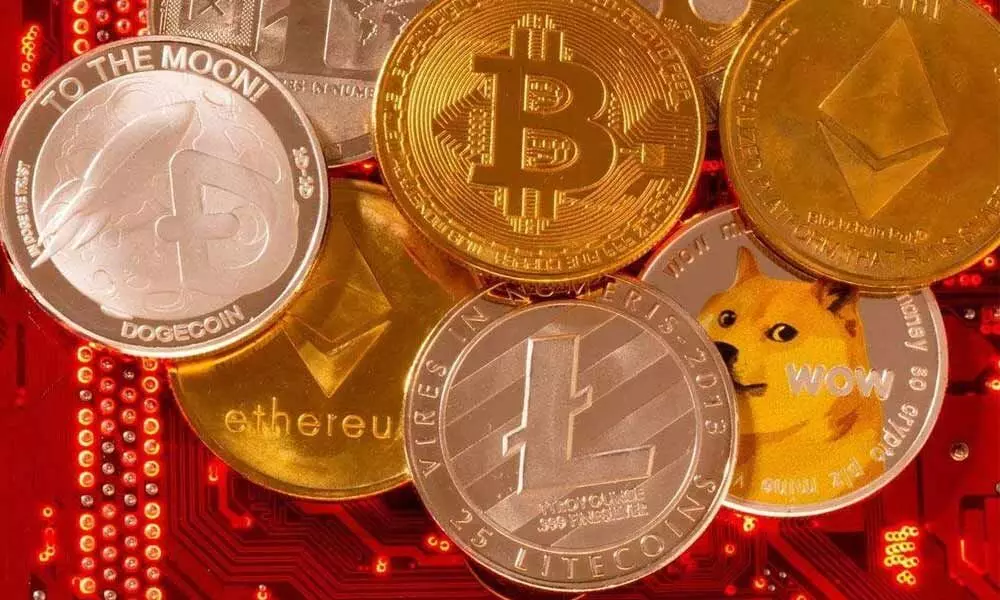It's high time govts around the world ban cryptocurrencies
Allowing cryptocurrencies and their transactions is nothing, but facilitating daylight robberies
image for illustrative purpose

We often hear this. In the ancient world, people strongly believed the earth to be a flat surface. That was the case till the fourth century BC. Some who expressed different opinions and put forth their argument in favour Earth being spherical in shape, were subjected to derision, sometimes punishment too. Of course, it has subsequently been proven scientifically that Earth is spherical in shape. But for thousands of years, the concept of 'flat earth' prevailed. The world now seems to be in a similar state of denial when it comes to cryptocurrencies.
A dictionary definition says cryptocurrency is a digital currency produced by a public network, rather than any government, that uses cryptography to make sure payments are sent and received safely. The cryptocurrency mania started with bitcoin which was released in 2009. Starting from zero, bitcoin saw its value skyrocketing in the last 13 years. As of now, one bitcoin is quoted at a mind-numbing $42,577.70. It's a fact that bitcoin software is designed in such a way that only 21 million units could ever be generated. Still, it's incomprehensible to me why people are pouring their hard-earned money into bitcoin which has no intrinsic value whatsoever. However, fueled by the popularity of bitcoin, hundreds of other private cryptocurrencies cropped up in the virtual world now. The cumulative market capitalization of all cryptocurrencies reached its peak at over $3 trillion in November 2021. This nosedived by nearly 50 per cent to over $1.7 trillion now. This clearly reflects how the investments into cryptos vanish into thin air.
Of course, people like Tesla founder Elon Musk contributed to the phenomenal rise of cryptocurrencies which mostly appear like Ponzi schemes. In February 2021, Tesla announced that it would purchase bitcoins worth $1.5 billion and would also start accepting the digital currency as payment for its vehicles. This Tesla's announcement had pushed up the price of bitcoin to a new peak. However, Tesla subsequently went back on its promise of accepting bitcoins as payment for purchasing its vehicles. And it is also not known whether the electric vehicle pioneer had purchased bitcoins as announced. But the fact of the matter is that Elon Musk is insanely rich. He is the richest person in the world now with a net worth of $224 billion (as of February 13, 2022). He retained his 'rich' crown even after losing $47 billion so far this year. So, he can afford to invest in cryptocurrencies and lose a few billions of dollars. That doesn't pinch him a wee bit. But common people who are investing their hard-earned money in cryptocurrencies should refrain from doing so as they will eventually turn dud. This applies to bitcoin as well.
In every country, certain functions should be the sole preserve of the government. That includes the currency. Can private courts, private armies be allowed? Absolutely not! Then how can private currencies be allowed? If cryptocurrency is allowed, it will threaten the very concept of a
nation-state. So, frankly speaking, there is no scope for private currencies.
Recently, Reserve Bank of India Governor Shaktikanta Das did a right thing by warning people not to invest in cryptocurrencies which, according to him, would not even be worth a tulip. That way, he was referring to a speculative bubble that haunted Netherlands in the 17th Century, pushing prices of tulip bulbs through the roof.
Warning that private cryptocurrency would pose a huge threat to macroeconomic and financial stability, Das announced that RBI would launch a digital rupee of its own. But I don't think the launch of a digital rupee will make any major difference as we have a physical currency in circulation and there are numerous ways to transact electronically these days.
However, he deserves appreciation for his forthright views on the private digital currencies, which came nearly a week after Finance Minister Nirmala Sitharaman surprised everyone by announcing 30 per cent tax on income from virtual digital assets including cryptocurrencies and 1 per cent TDS
(tax deducted at source) on all transactions related to them.
Though Sitharaman clarified multiple times that her announcement would not tantamount to legalising cryptocurrencies, the move to tax an illegal asset painted the government in poor light. The government should come clean on the legality of the cryptocurrencies before going ahead with its taxation plans.
But it's better if the Indian government bans all cryptocurrencies, thus showing a way to the world as China, the world's largest crypto market, did. There is no point in dilly-dallying as lakhs of Indians are pouring their hard-earned money in cryptocurrencies which don't have any underlying value. If the governments around the world don't ban cryptocurrencies, it will tantamount to encouraging daylight robberies. Nothing less. However, the blockchain technology which underpins cryptocurrencies is a game changer for financial sector. It should be tapped fully.

